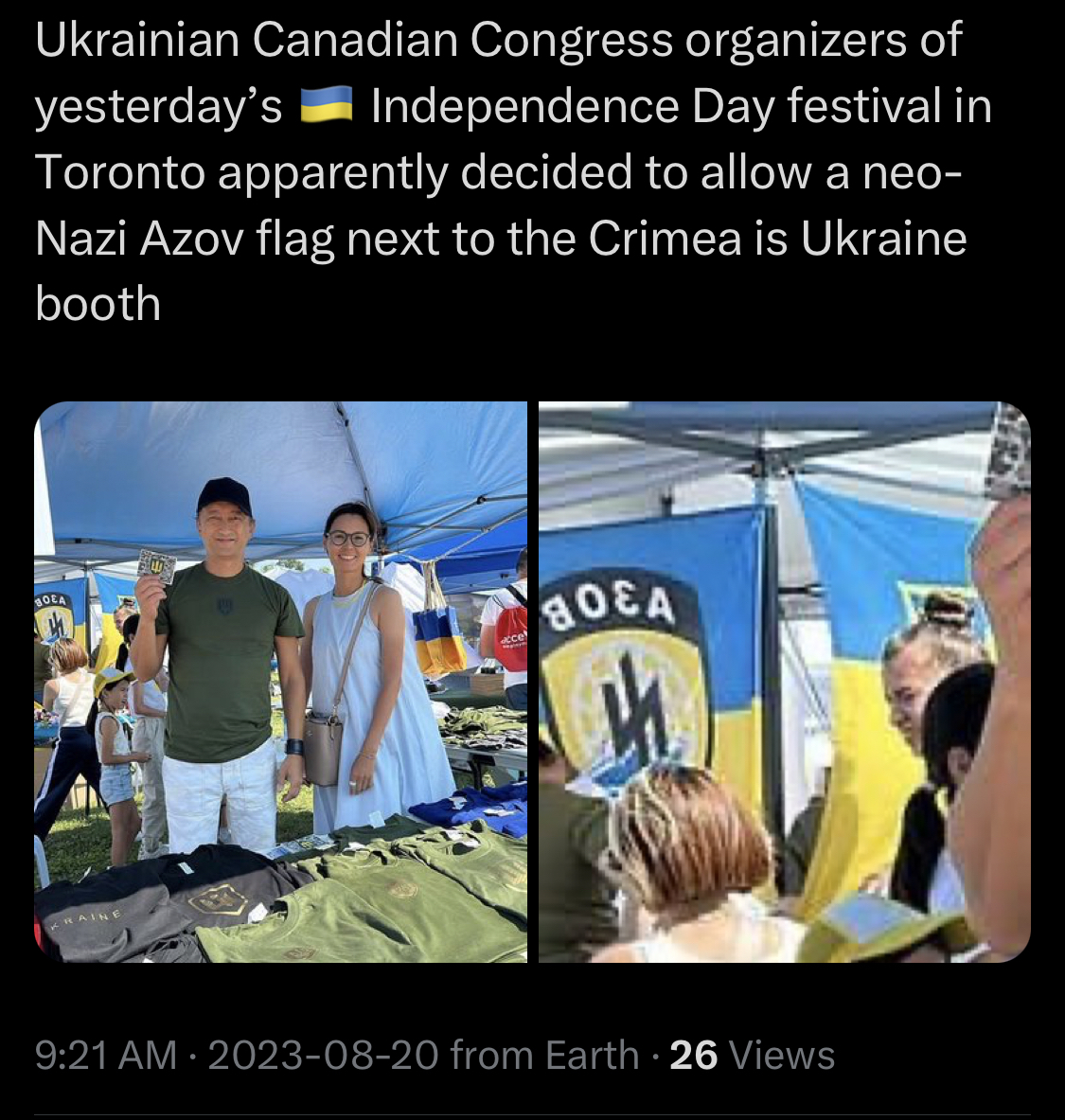this post was submitted on 20 Aug 2023
104 points (92.6% liked)
Nonsense 🇺🇦 Takes (LOCKED)
379 readers
1 users here now
This community is locked -- use /c/shitreactionariessay@lemmygrad.ml instead.
All terrible 🇺🇦 takes, all the time.
Takes do not have to be Ukraine/Russia related. Any bad take from a 🇺🇦 will suffice.
founded 2 years ago
you are viewing a single comment's thread
view the rest of the comments
view the rest of the comments

Do you have some links about this? I have some Canadians I would like to poke
Look for “Fraud Famine and Fascism” by Douglas Tottle on libgen and have a read.
I saw the Amazon reviews for this book and damn people are pissed off. Only one person gave five stars and an extensive overview which was very refreshing. I’m definitely going to give it a read. Do you think this book would be considered a reliable source for say, I don’t know, academic papers or something?
It’s political polemic written by a prominent Canadian trade unionist and communist party member so no it wouldn’t pass muster as an academic source, but it was written with rigor and he cites his sources.
What he writes is a collecting of facts established by others that he then peppers with (righteous) polemic, and it’s that polemic which makes it unsuitable for academia rather than the reliability of the information within it.
The three major claims are
If you want solid academia that relies on data then refer to Tauger. He’s the only historian I’ve encountered who actually preferences economic data (which he rigorously cross checks against other indicators to ensure it’s reliability, eg comparing grain yields to prices to ensure the data is consistent across various dimensions). He has been trashed over the past decade mostly by Applebaum who relies on anecdote and human stories, frequently from the Ukrainian SS refugees in Canada and also has at times used the same photos the Nazis used that were of previous famines in other locations.
The other major historian who pushes the genocide narrative in the west is Timothy Snyder mostly in his work “bloodlands” which was written for a popular audience rather than an academic audience, which also is notable for relying significantly on anecdote. His work also suffers from the way he tells his story, which he presents alongside the Nazi atrocities and sometimes Polish atrocities, seeking to join all these events together in a narrative sense by telling these accounts side by side even though there is little reason to group all these events together.
Edit: oh and Wheatcroft is another much earlier proponent of the genocide narrative who attempted to engage Tauger on the data and Tauger gave him an absolute smack down in a series of essays, which were published but written as letters more or less. Wheatcroft ends up basically name-calling as Tauger gives a veritable smack down based on data and for a while this represented something of the consensus position, that it was a famine mostly driven by natural causes, partly exacerbated by collectivization, that the Soviets paused collectivization once they realized how bad things were on the ground, how the Soviets also engaged in famine relief efforts, and how the single biggest man-made contributor to the famine was the mass slaughter of animals especially horses and cattle by the small percent of the population who owned a lot of land, not a genocide.
Also other historians who are extremely hostile to the USSR such as Stephen Kotkin also say it wasn’t a genocide, which indicates the general consensus that existed on this topic before Ukrainian nationalism became useful to US foreign policy goals.
Thank you so much for this, I’m heading back to university for my next semester and need all the guidance I can get. I was definitely heading in the direction of going over the sources he sites in the book but your extra information and clarifications are incredibly helpful.
You’re very welcome but honestly in the current political climate you’d be best not touching this topic at university because people will come after you.
But it’s a very interesting history, by which I mean the history of how the narrative was created is very interesting.
There is another work that is completely unrelated to the Ukrainian genocide, completely not related, but it does an excellent job of describing how history is constructed by the elites of society to support their ideology. It’s “the assassination of Julius Caesar” by Michael Parenti. I’ll repeat that it has absolutely nothing to do with ukraine, as the title suggests it’s about the assassination of Julius Caesar but more than that it’s an exploration of the way history is written by elites and propagated by “respectable” parts of society, invariably the institutions aligned with the wealthiest parts of society, and how history serves a vital role in propaganda.
If you’re studying history, you’ll love it.
My majors are in psych and polisci but I’m sprinkling in some history classes as well. This semester I’m taking a history class so I’m really looking forward to it.
I love the title because, aside from the actual assassination, it's about character assassination.
Pardon me, but is there a title that the collection of Wheatcroft / Tauger letters are published under?
I’m not sure if they’ve been collected. They were a series of letter-essays published in journals of economic history / political sciences.
Eg
https://www.researchgate.net/publication/232889148_Arguing_from_errors_On_certain_issues_in_Robert_Davies'_and_Stephen_Wheatcroft's_analysis_of_the_1932_Soviet_grain_harvest_and_the_Great_Soviet_famine_of_1931_-_1933
https://agrarianstudies.macmillan.yale.edu/sites/default/files/files/papers/TaugerAgrarianStudies.pdf
You can steal most of Tauger’s work from libgen http://libgen.is/search.php?req=Mark+tauger